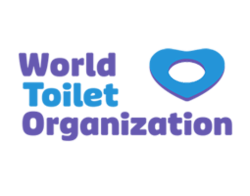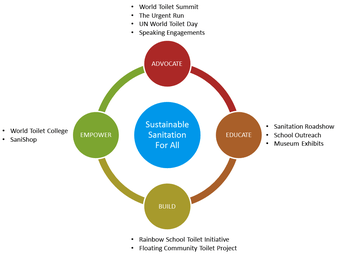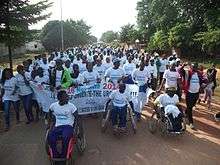World Toilet Organization
The World Toilet Organization (WTO) is a global non-profit organization committed to improving toilet and sanitation conditions worldwide. It was founded in 2001[1] with 15 members and has now grown to 151 member organizations in 53 countries. All these members work towards eliminating the toilet taboo and delivering sustainable sanitation solutions worldwide.[2] Furthermore, the WTO is also the organizer of the World Toilet Summit, the Urgent Run and initiated the United Nations World Toilet Day.[3]
 | |
| Formation | 2001 |
|---|---|
| Founder | Jack Sim |
| Type | Non-profit organization |
| Focus | Improving toilet and sanitation conditions |
| Headquarters | Singapore |
Region served | Worldwide |
| Method | Advocacy, capacity building, training, building market infrastructure, knowledge management, networking |
| Website | www |
Mission and history
WTO was founded by Jack Sim in Singapore on 19 November 2001. Since its inception, WTO has brought together governments, academia, civil society, multilateral agencies and the private sector to explore innovative and sustainable solutions to end the global sanitation crisis. WTO’s mission is to promote the global sanitation movement through collaborative action that inspires and drives demand for sanitation and provides innovative solutions to achieve sustainable sanitation for all.

Key pillars of WTO’s work:
- Advocate to change policy on sanitation: Through its global advocacy efforts, WTO hopes to break the taboo associated with sanitation. Its advocacy events include the annual World Toilet Summit, World Toilet Day and Urgent Run.
- Educate to change mind-sets on sanitation: WTO collaborates with grassroots organisations and schools to increase awareness of the importance of sanitation in local communities. It does this via public exhibition roadshows and school sanitation and hygiene promotion programs.
- Build to develop sanitation infrastructure and capacity: WTO builds toilet infrastructure in various schools and communities in several developing countries. It does this directly, for example through the Rainbow Toilet Initiative in China or via its partners, for example in the Floating Community Toilet project in Cambodia.
- Empower to bring about long term social change on sanitation: WTO takes a market-based approach that empowers communities to solve their own sanitation challenges. This is done via the World Toilet College training model which builds capacity for sanitation workers and professionals and also via its social enterprise model, SaniShop.
Activities
| Activities | Year | World Toilet Summits |
| Founded World Toilet Organization
Established World Toilet Day 19 Nov |
2001 | Singapore: 19 - 21 Nov |
| World Toilet Summit | 2002 | Seoul, South Korea: 21 Oct – 2 Nov |
| World Toilet Summit | 2003 | Taipei, Taiwan: 10–12 October |
| World Toilet Summit | 2004 | Beijing, China: 17 - 19 Nov |
| Launched World Toilet College | 2005 | Belfast, Northern Ireland: Sept 26 - 29 |
| Accredited by United Nations Environment Programme (UNEP) | 2006 | Moscow, Russia: Sept 6 - 9 |
| Co-founded Sustainable Sanitation Alliance (SuSanA) | 2007 | New Delhi, India: 30 Oct – 3 Nov |
| Partnered with ICC, USA for setting Global Standards & Codes for toilets | 2008 | Macau, China: 2 - 4 Nov |
| Launched Sanishop in Cambodia – World’s 1st sanitation social enterprise | 2009 | Singapore: 2 - 4 Dec |
| World Toilet Summit | 2010 | Philadelphia, USA: 4 - 6 Dec |
| First local NGO to create and implement a Clinton Global Initiative (CGI) | 2011 | Hainan Island, China: 22 - 24 Nov |
| Launched Sanishop India in partnership with eKutir
Launched Sanishop Vietnam in partnership with Unilever |
2012 | Durban, South Africa: 4 - 6 Dec |
| United Nations adopted 19 Nov as UN World Toilet Day
Achieved special consultative status with the UN ECOSOC |
2013 | Solo, Indonesia: 1 - 4 Oct |
| Launched the Urgent Run for UN World Toilet Day | 2014 | |
| Launched Floating Toilet Community Project in partnership with Wetlands Work! | 2015 | New Delhi, India: 19 - 20 Jan |
| Launched World Toilet College in India with GIWA and Reckitt Benckiser
Launched Rainbow School Toilet Initiative in Henan Province, China Launched 50 Years of Sanitation Excellence Roadshow in Singapore |
2016 | Kuching, Malaysia: 27 - 29 Oct |
Founder
Jack Sim is the founder of the World Toilet Organization, the BoP HUB and is a global advocate for sanitation. Formerly in the construction industry, he founded WTO in 2001 after attaining financial independence at age of 40 and deciding to devote the rest of his life to social work. For ‘creating good will and bringing the subject into the open’ and ‘mobilizing national support in providing on-the-ground expertise’ Jack Sim received the Schwab Foundation award for Social Entrepreneur of the Year in 2001. In 2007, Jack became one of the key members to convene the Sustainable Sanitation Alliance composed of key players for sanitation. He is an Ashoka Global Fellow, and was named one of the Heroes of the Environment for 2008 by Time Magazine.
Initiatives
World Toilet Summit
The World Toilet Summit & Expo (WTS) is a global platform that brings together sanitation stakeholders to share, learn and collaborate to address the global sanitation challenge. The annual summit is jointly organised by a host government or organization involving policy makers, toilet associations, non-profits and for-profit entities and private sector stakeholders in the sanitation sector. WTS aims to empower these key players to exchange knowledge, expertise and resources in scaling up impact and innovation in the sanitation marketplace.
World Toilet Day
WTO was founded on 19 November 2001 and the inaugural WTS was held on the same day. WTO recognized the need for an international day to draw global attention to the sanitation crisis – and so established World Toilet Day.[4] NGOs, the private sector, civil society organisations and the international community joined in to mark the global day.

Urgent Run
Each year, WTO commemorates WTD with the Urgent Run. The Urgent Run is a call for urgent action to end the sanitation crisis and aims to bring communities around the world together to raise awareness for the global sanitation challenge and engage people with sanitation issues in their local communities. For the past few years, in the lead-up to UN World Toilet Day, communities worldwide have come together to organize sanitation-themed Urgent Runs in varying formats and include fun runs, educational events, awareness walks, toilet cleaning programs, carnivals and even motorbike parades. They are organised by community groups, companies, universities, volunteers and NGOs to engage their local communities on their sanitation challenges.[5]
Projects supported
Rainbow School Toilet Initiative
Many school toilets in rural China face problems of having old, unhygienic dry system toilets, absent hand washing facilities, and are often designed where the excreta disposal site is located right behind the toilet building – uncovered and exposed to the environment. Often, these schools lack a cohesive management system to upkeep and maintain the facilities, resulting in the toilet falling into a state of disrepair and neglect. This coupled with students who do not practice good hygiene habits, like handwashing with soap, can result in long-lasting health and environmental consequences.
With the aim of inspiring positive, long-lasting behavioural change among Chinese students, WTO`s Rainbow School Toilet Initiative was launched in 2015. In 2016 4 rural schools, with an estimated 1,300 students (average 300 students per school) benefited from the new toilet buildings equipped with a recyclable wastewater treatment plant.[6]
Floating Community Toilet Project
Until 2018, no proper sanitation solution existed for the almost 100,000 people living in floating communities on Cambodia’s Tonle Sap Lake. To address sanitation issues in these floating communities, Wetlands Work! (WW) developed the HandyPod, a product that contains the raw sewage and treats it by harnessing various biological processes. This project aims to eliminate open defecation by providing sanitation systems to floating schools and teaching students to use toilets; improve sanitation and hygiene; reduce school absences due to diarrhea; increase school attendance especially for girls, as well as driving demand for household toilets.
WTO and WW raised funds for the project through various platforms and in 2016 a total 8 HandyPods have been installed befitting approximately 900 students and 650 indirect beneficiaries in their households. The project was developed with a holistic and sustainable approach of technology (Handypods) and behavioural change (hygiene awareness classes) to the communities.
World Toilet College
The World Toilet College (WTC) started as a social enterprise in 2005 with the belief that there is a need for an independent world body to ensure best practices and standards in toilet design, cleanliness and sanitation technologies. While the lack of toilets is an endemic problem, poor management and hygienic maintenance are equally serious issues. A well-kept toilet will encourage proper usage and prevent deadly diseases.[7]
The goal of WTC’s programmes is to ensure the dignity of sanitation workers and elevate the otherwise poor image (and consequent low pay) reserved for this employment category in many places around the world. WTC does this by training and providing toilet cleaners with professional skills in both cleaning and performance of small repairs, thereby boosting their self-confidence. This empowers them with the opportunity to master the profession while at the same time enhancing their productivity. Since 2005 WTC has trained more than 5,000 people across its various courses and conducted programmes and courses.
SaniShop
WTO created SaniShop, a social enterprise that improves sanitation conditions globally by empowering local entrepreneurs. The organization started its market-based approach in Cambodia in 2009 in collaboration with the University of North Carolina, Lien Aid and iDE in Kampung Speu. Since then SaniShop has built more than 12,000 household toilets and trained more than 526 sales entrepreneurs in 7 provinces.
The SaniShop model is a self-sustaining market ecosystem. WTO teaches community members to educate and spread messaging regarding the importance of good hygiene and sanitation, whilst training masons to build new toilets and to market them to their community. WTO believes in addressing the issue of inadequate sanitation and to end open defecation via a multi-pronged approach that inspires behavioural change both in the individual, and community.
See also
- WASH (Water, Sanitation, Hygiene)
References
- Dueñas, Christina (2007). "Water for All". Archived from the original on 29 December 2011. Retrieved 10 March 2009.
- Sim, J. (2017). World Toilet. World Toilet. Retrieved 5 May 2017, from http://worldtoilet.org/who-we-are/our-story/
- World Toilet Day Official – A day to think and take action. (2016). Worldtoiletday.info. Retrieved 5 May 2017, from http://www.worldtoiletday.info/
- "Don't Laugh: World Toilet Day Aims to Promote Sanitation, Rid World of Disease". Fox News. 19 November 2008.
- "What's the urgency?". The Urgent Run. Retrieved 14 November 2017.
- manic, & Sim, J. (22 March 2016). World Toilet. Retrieved 5 May 2017, from http://worldtoilet.org/delivering-hygiene-promotion-classes-to-the-students-of-tai-ping-primary-school-in-badong-county-hubei-province/
- "World Toilet College Set To Open In India". Forbes. 24 September 2015. (subscription required)